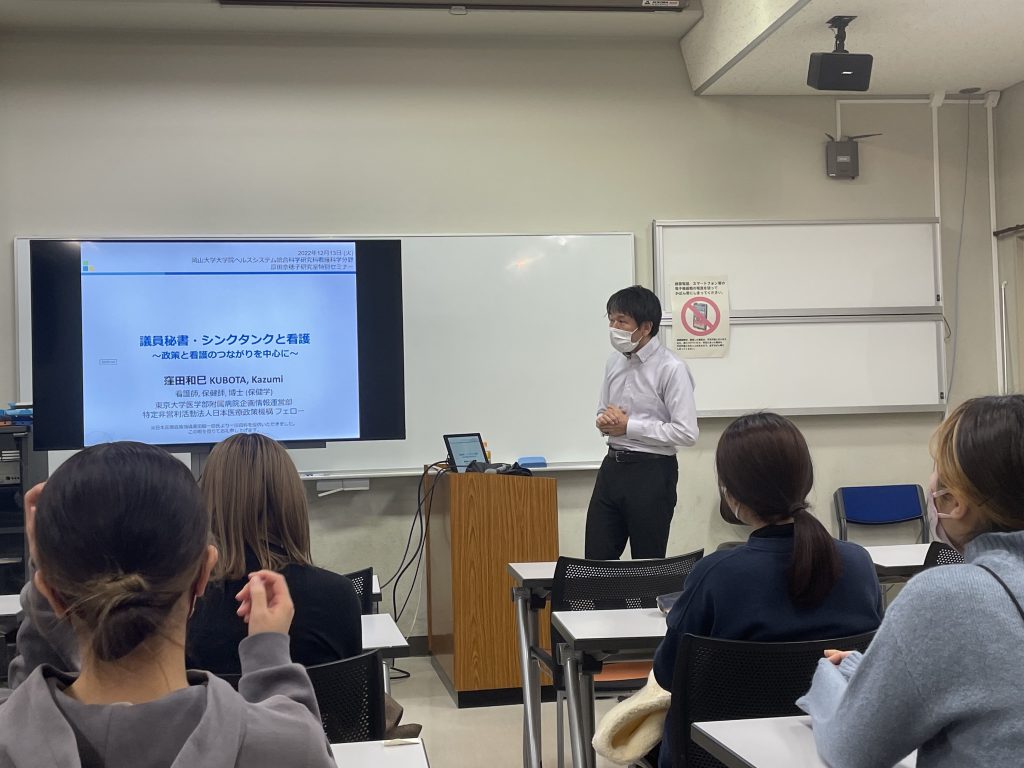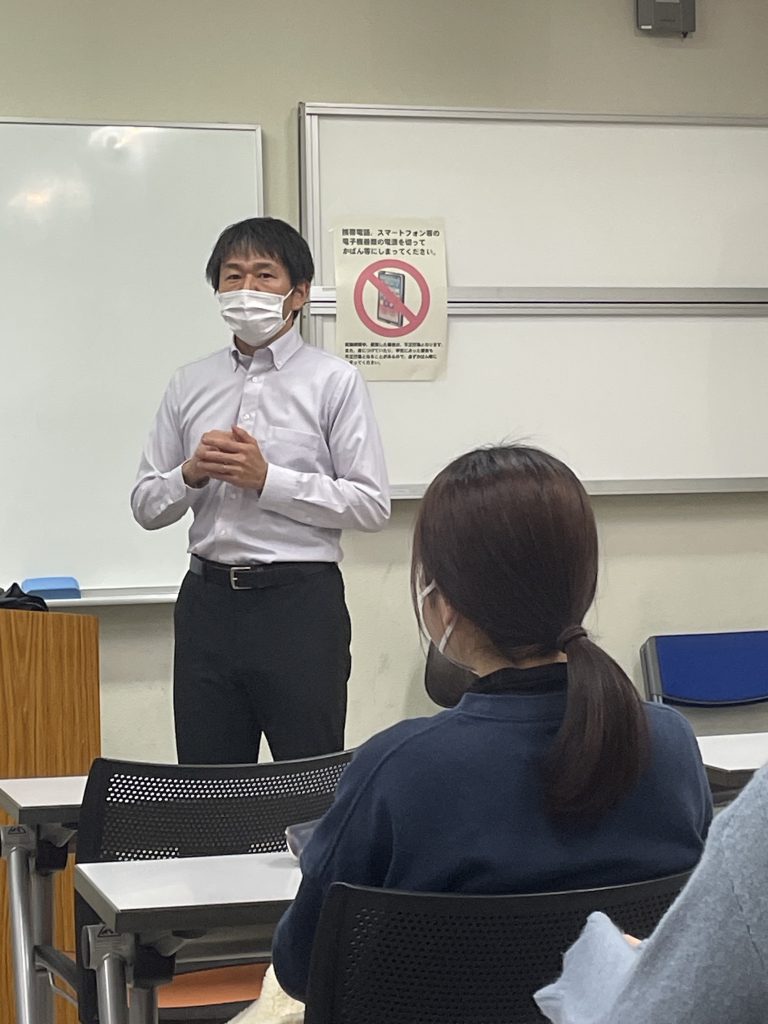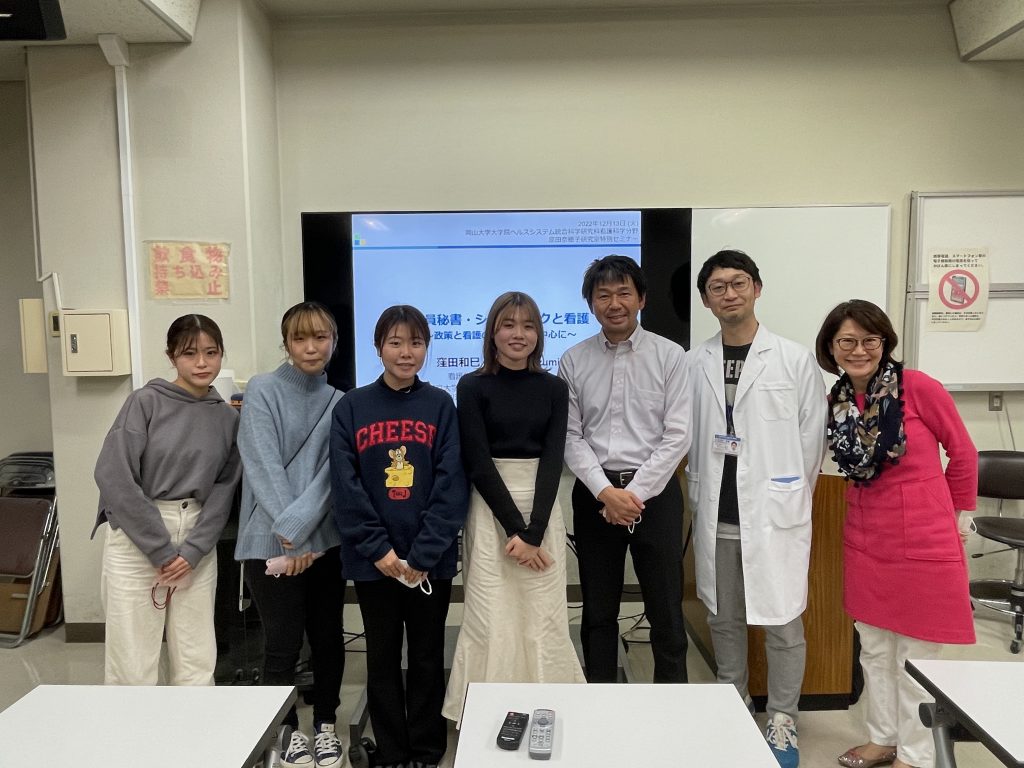12月13日に、東京大学医学部付属病院 企画情報運営部 特任助教の窪田和巳先生による「シンクタンクと看護」特別講義を化に際しました。以下は教員からのレポートです。
今回の演題テーマにもあるシンクタンクとは、「社会政策、政治、経済などのテーマに関する研究をおこなう組織」のことである。窪田先生は、日本医療政策機構というシンクタンクで研究員をされており、これまでに様々な医療政策をテーマに研究活動を通して政策提言をおこなってきた実績をもたれている。現在は、医療ビッグデータを用いたエビデンス構築などに尽力されており、国外の学会にも精力的に参加し、研究発表をおこなっている。
本日の講演では、「国内における医療問題と政策について」、「発展途上国での医療保健活動について」、「海外の学術集会に参加することの意義」などについて話をしてくれた。国内の医療福祉に目を向けると、2022年の社会保障費は130兆円超となっており年々増加の一途をたどっている。また、超高齢多死社会に突入しており2030年には約40万人が在宅看取り難民となることが予想されているなど、日本国内の医療問題は噴出している。制限のある財源の中で、医療福祉における喫緊の課題は何か、看護が抱える問題は何か、そのためにはどのような施策が必要なのかを研究を通して政治に投げかけること、現場で働く看護師もこれらの思考を必要としていることを聴講者に投げかけてくれた。また、国外の主要な看護系学術集会に参加することで世界の情勢やスタンダードを知ることができ、世界基準と照らし合わせた国内の問題にも目を向けることができることも話をしてくれた。
窪田先生の話を聞く中で、自身は施設内での患者アウトカムの向上に関して思考・実践することはあれども政策を意識して看護実践を行っていなかったということに気づくことができた。また、退院後の患者の生活を考えながら急性期医療に携わってきてはいたが、正しく地域の問題や現場の医療ケア提供体制について知る機会に触れてこなかったことを痛感した。国内はもちろん、国外でどのように看護における問題が話し合われているのか、よりグローバルな情報収集を行うことが今後の自分に必要であると理解できた。今回の窪田先生の話は総じてスケールの大きな話であったが、そう感じたのは、それだけ自分の見てきた(見ようとしてきた)世界が限られたものであることが理解できた。知らないことを知ることができたといった点で、とても有意義な時間であった。
On December 13, 2022, Dr. Kazumi Kubota, a Specially Appointed Assistant Professor in the Department of Planning and Information Management at the University of Tokyo Hospital, delivered a special lecture on “Think Tanks and Nursing.” The following is a report from a faculty member who attended the lecture.
The focus of the lecture was on think tanks, which are organizations that conduct research on topics such as social policy, politics, and economics. Dr. Kubota is a researcher at the Japan Health Care Policy Institute, a think tank that has a history of proposing policies through research on various healthcare policy themes. Currently, Dr. Kubota is working to build evidence using medical big data and actively participates in and presents research findings at international conferences.
During the lecture, Dr. Kubota discussed “medical challenges and policies in Japan,” “healthcare activities in developing countries,” and “the importance of participating in overseas academic conferences.” When examining domestic medical welfare, it is projected that social security expenditures in 2022 will exceed 130 trillion yen, with costs increasing annually. Additionally, as Japan becomes a super-aged society with multiple health issues, it is predicted that by 2030, around 400,000 people will be unable to access end-of-life care at home. With limited financial resources, Dr. Kubota emphasized the need for nurses working in the field to consider these challenges, identify pressing issues in medical welfare, recognize the problems nursing faces, and determine the necessary measures to address them through research and political engagement. She also highlighted how attending major nursing conferences outside of Japan can help professionals learn about global standards, gain insights into the world situation, and refocus on domestic issues.
Listening to Dr. Kubota’s talk, I realized that although I have been striving to improve patient outcomes in my facility, I had not been practicing nursing with policy considerations in mind. Moreover, while I have been engaged in acute care and thinking about patients’ lives post-discharge, I recognized that I have not had the opportunity to properly learn about local issues and on-site healthcare delivery systems. I now understand the importance of gathering global information to comprehend how nursing issues are discussed in Japan and other countries. This realization made me aware of how limited my perspective has been. The lecture provided a valuable opportunity for me to learn about aspects of nursing that I was previously unaware of.



文責 北別府孝輔助教
Report by Assistant Professor, Kosuke Kitabeppu.
本特別講義はJSPS科研費JP22K10842の助成を受けて開催しました。
This special lecture was made possible with the support of JSPS Grant No. JP22K10842.
